|
|
|
Sort Order |
|
|
|
Items / Page
|
|
|
|
|
|
|
| Srl | Item |
| 1 |
ID:
181815
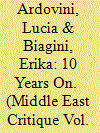

|
|
|
|
|
| Summary/Abstract |
Although the popular protests that swept across the Middle East and North Africa in 2011 were short-lived, their long-term consequences are still resonating through the region a decade after their outbreak. Islamist movements have been affected in different ways by the drastic change in the political, social and geographical contexts in which they historically operated, highlighting the need for a renewed examination of these changed circumstances. Based on the case study of the Egyptian Muslim Brotherhood, we argue that three key factors need to be accounted for when studying Islamist movements in the aftermath of the 2011 uprisings. These are the dimension of exile; the increased role played by women and youth; and the emergence of cross-generational and cross-ideological alliances. The article analyzes these three factors through a comparative study of responses by Muslim Brotherhood and Muslim Sisterhood members to repression across Egypt, Turkey and the UK.
|
|
|
|
|
|
|
|
|
|
|
|
|
|
|
|
| 2 |
ID:
106379
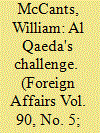

|
|
|
|
|
| Publication |
2011.
|
| Summary/Abstract |
On 9/11, the global jihadist movement burst into the world's consciousness, but a decade later, thanks in part to the Arab Spring and the killing of Osama bin Laden, it is in crisis. With Western-backed dictators falling, al Qaeda might seem closer than ever to its goal of building Islamic states. But the revolutions have empowered the group's chief rivals instead: Islamist parliamentarians, who are willing to use ballots, not bombs.This article appears in the Foreign Affairs eBook, "The U.S. vs. al Qaeda: A History of the War on Terror." Now available for purchase.
|
|
|
|
|
|
|
|
|
|
|
|
|
|
|
|
| 3 |
ID:
106872
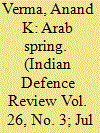

|
|
|
| 4 |
ID:
124946
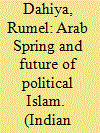

|
|
|
| 5 |
ID:
110117
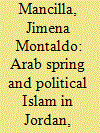

|
|
|
| 6 |
ID:
122355
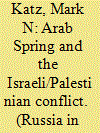

|
|
|
|
|
| Publication |
2013.
|
| Summary/Abstract |
The main impact of the Arab Spring has not been to increase, but to diminish the importance of the Israeli/Palestinian conflict for the broader politics of the Arab World.
|
|
|
|
|
|
|
|
|
|
|
|
|
|
|
|
| 7 |
ID:
111597
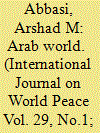

|
|
|
| 8 |
ID:
126415
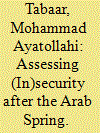

|
|
|
|
|
| Publication |
2013.
|
| Summary/Abstract |
In nearly three years, Egypt has transitioned from a large-scale uprising against one of the region's longest-standing rulers to an even more massive revolt that led to the military ousting the country's first democratically elected president, Mohamed Morsi. Between the two popular uprisings, new pacts and unlikely alliances emerged, deepened, and, in some cases, then disappeared. For its part, the army evolved from being an accomplice of the old regime, to then being an uneasy partner of the ascendant Muslim Brotherhood and, most recently, on to rebranding itself as an ally of non-Islamists and a protector of the popular will. Loosely aligned liberals, leftists, and nationalists, meanwhile, shifted from offering support for democratic elections to backing a "democratic" coup out of fear that the elected Islamists might monopolize and never relinquish power in a conservative new regime. That fear came in response to the Brotherhood's own shifting position, which moved from a commitment to "participation not domination" to a strategy of controlling the legislature and the presidency, although they were ultimately forced back into hiding before they could neutralize the judiciary and the army. And finally, the other Islamist movement, the ultraconservative Salafists, initially displayed no interest in the political process, but then mobilized and ultimately enjoyed striking success in the elections of 2011-12. Surprisingly, however, despite their presumed ideological proximity to the Brotherhood, many Salafists went on to back the military's removal of Morsi in July 2013, but then did not lend support to the interim government that was constructed in wake of Morsi's fall. In this multilayered, fast-paced political environment, mass protests, arrests, and violence have become routine.
|
|
|
|
|
|
|
|
|
|
|
|
|
|
|
|
| 9 |
ID:
104640
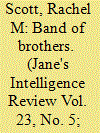

|
|
|
| 10 |
ID:
172447
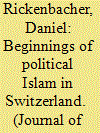

|
|
|
|
|
| Summary/Abstract |
When the Muslim Brotherhood (MB) was banned in Egypt in 1954, many of its followers and leaders found refuge and support in conservative Islamic countries, most notably in Saudi Arabia and Jordan. In the late 1950s, a Saudi diplomat approached the Swiss authorities with plans to open an Islamic Center in Geneva. From the beginning, the Swiss authorities welcomed the project, because it was supported by several pro-Western Arab countries, which opposed Egypt under Nasser. Swiss-Egyptian relations had been strained for some years because of Nasser’s socialist policies and Egypt’s espionage and propaganda operations in Switzerland. The Islamic Center eventually opened in 1960, and was headed by Said Ramadan, an exiled leader of the Muslim Brotherhood. Egyptian officials tried to thwart the Center’s activity and competed with it over influence on the small Arab student body then residing in Switzerland. As a politically active foreigner, the Swiss looked with suspicion on Ramadan. Still, they felt sympathy for his anti-Nasserist and anti-Communist stance, ignoring internal reports revealing the anti-Western and anti-Semitic nature upon his ideology. After 1966, the Swiss Ministry of Foreign Affairs believed Nasser’s Arab nationalism to be in terminal decline, expecting that Islamists might soon come to power in the Middle East. As a result, they decided to allow Ramadan and his family to remain in Switzerland despite overstaying their residence permits. This article sheds light on the founding years of the MB in Europe, a development still largely unchartered by historians, and the reaction of the Swiss to the appearance of a new phenomenon in Europe: political Islam. It argues that the context of Swiss-Egyptian relations is essential for understanding Swiss actions toward the Muslim Brotherhood.
|
|
|
|
|
|
|
|
|
|
|
|
|
|
|
|
| 11 |
ID:
143117
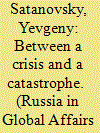

|
|
|
|
|
| Summary/Abstract |
The good thing about our world today is that the spread of information leaves little secret about history. To illustrate this I would like to remind our readers about the Anglo-Russian Convention signed in St. Petersburg in 1907, which left Tibet with China, put Afghanistan under British rule, and divided Iran between Britain and Russia, giving the latter control over the Caspian Sea. If the October Revolution of 1917 had not taken place, the Great Game would have been over. The Sublime Porte shrank enormously after World War I, Russia acquired new territories in Eastern Anatolia under the Sykes-Picot Agreement (a special provision gave Russia control over the Black Sea Straits), and the U.S. presence in the Middle East was barely noticeable, while Britain and France played a leading role in the region.
|
|
|
|
|
|
|
|
|
|
|
|
|
|
|
|
| 12 |
ID:
110154
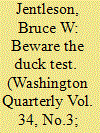

|
|
|
| 13 |
ID:
106101
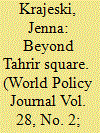

|
|
|
| 14 |
ID:
129514
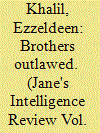

|
|
|
| 15 |
ID:
128175
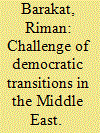

|
|
|
|
|
| Publication |
2012.
|
| Summary/Abstract |
The younger generation should focus on gradual and systematic social change that includes promoting human rights values and various freedoms.
|
|
|
|
|
|
|
|
|
|
|
|
|
|
|
|
| 16 |
ID:
117823
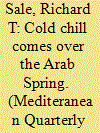

|
|
|
|
|
| Publication |
2012.
|
| Summary/Abstract |
Islam is on the march in the Middle East. For the past few years, in every Mideast election, the Islamic parties have won: in the Gaza Strip in 2006 and in Iraq and Tunisia in 2010. In 2011, they won again in Turkey and Morocco, and in Egypt the Islamist parties confirmed an overwhelming victory in the first parliamentary elections since the overthrow of Hosni Mubarak. The Muslim Brotherhood won the biggest share with the hard-line Salafist al Nour Party of Light. The youth groups that staged the demonstrations that toppled Mubarak took only seven seats. What are the implications for US policy and its ideals of self-determination and human rights? Will the liberals triumph, or will the Egyptian people face a hard-line Islamic future? This article attempts to answer these questions.
|
|
|
|
|
|
|
|
|
|
|
|
|
|
|
|
| 17 |
ID:
126410
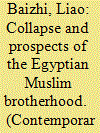

|
|
|
| 18 |
ID:
133505
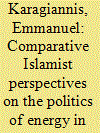

|
|
|
|
|
| Publication |
2014.
|
| Summary/Abstract |
The article will describe the general Islamic approach on energy based on the Sunnah of Prophet Muhammad, as well as the writings of prominent Muslim thinkers. Then it will examine and compare the energy perspectives of four Islamist groups: Hizballah, Hizb ut-Tahrir, the Muslim Brotherhood, and Al Qaeda. It will be argued that Islamist groups have attempted to achieve their external energy objectives by either using violence or exercising political blackmail against their opponents. Moreover, Islamists have developed globalized, glocalized, or localized "scale of engagement," depending on the targeted audience. Finally, the article will examine the security implications stemming from Islamists' interest in energy issues.
|
|
|
|
|
|
|
|
|
|
|
|
|
|
|
|
| 19 |
ID:
189178
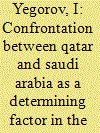

|
|
|
|
|
| Summary/Abstract |
THE PARADIGM of international relations in the Persian Gulf in the 20th century was determined by the interests of major players: the US, Great Britain, the USSR, etc. At the same time, relations between the oil-producing monarchies of the region, for all their complexity and ambiguity, remained in the background. After the creation of the Gulf Cooperation Council (GCC) in the early 1980s, opportunities emerged for a serious integration process that could lead to the creation of a single economic space with a single currency and common governance structures. However, for a number of reasons - among which we will identify economic ones (similarity in export structure), dynastic ones (ambitions of the ruling families), and geopolitical ones (the desire of the US as the world hegemon to rule according to the "divide and rule" policy known since antiquity) - centripetal trends have given way to centrifugal ones. Moreover, the second decade of the 21st century as a whole was marked by the gradual departure of the main global player, the US, from the traditional doctrine of firm control to using "controlled chaos" tools to give regional players the opportunity to realize their own political ambitions, while the US mainly focused on protecting its key military, political, and economic interests.
|
|
|
|
|
|
|
|
|
|
|
|
|
|
|
|
| 20 |
ID:
144886
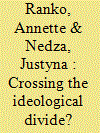

|
|
|
|
|
| Summary/Abstract |
An important strand in the literature has stressed the analytical distinction between the Muslim Brotherhood's brand of Islamism and the Salafist movement. This article examines the shifts that have occurred within these two movements in Egypt since the Arab Spring. It specifically asks whether approximations between them in terms of strategies of actions have been paralleled by ideological approximations. The article argues that both movements have seen increased diversification which has—especially at the fringes—involved a reshaping of identities and ideological approximations that may facilitate cooperation between segments of these movements in the future.
|
|
|
|
|
|
|
|
|
|
|
|
|
|
|
|
|
|
|
|
|